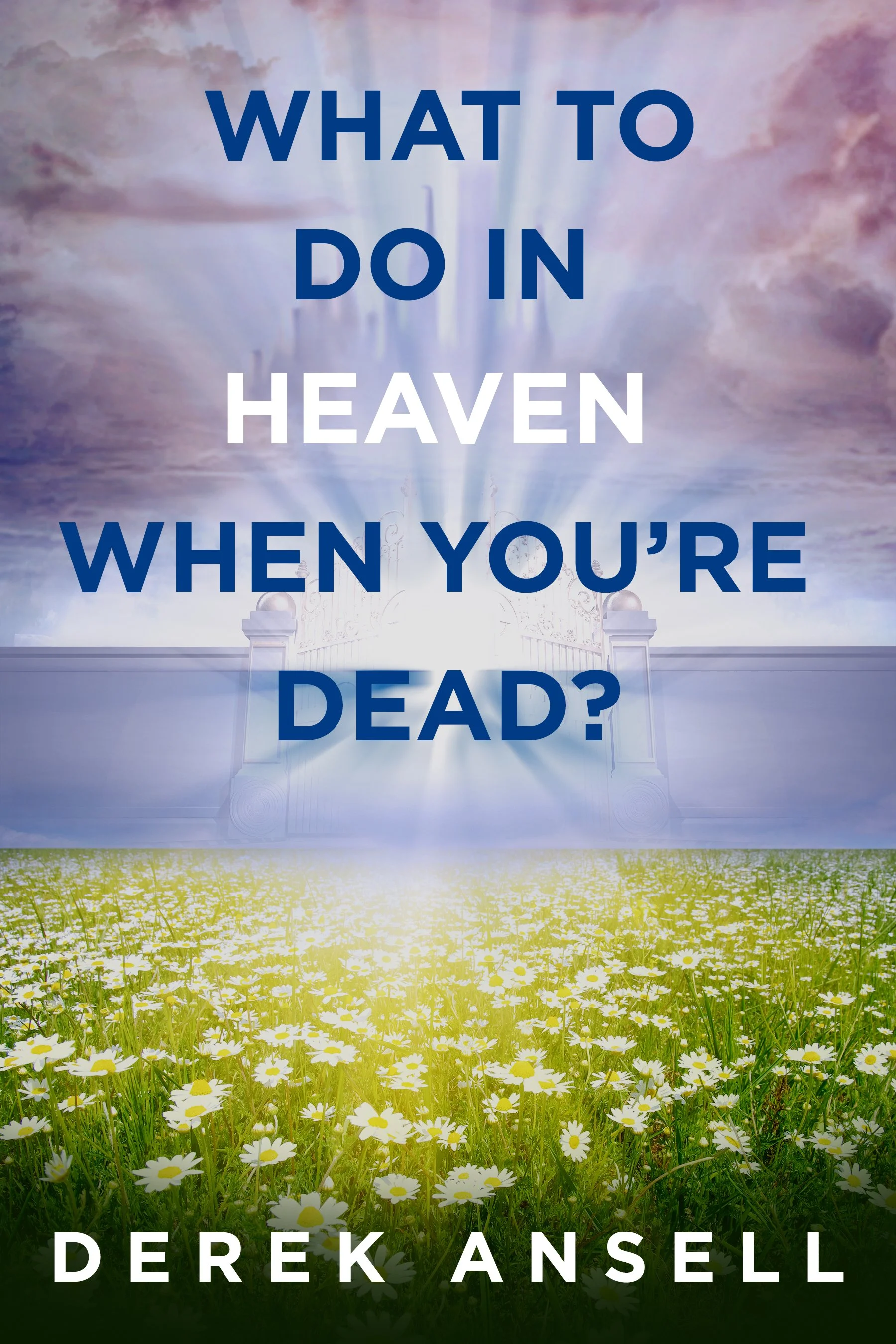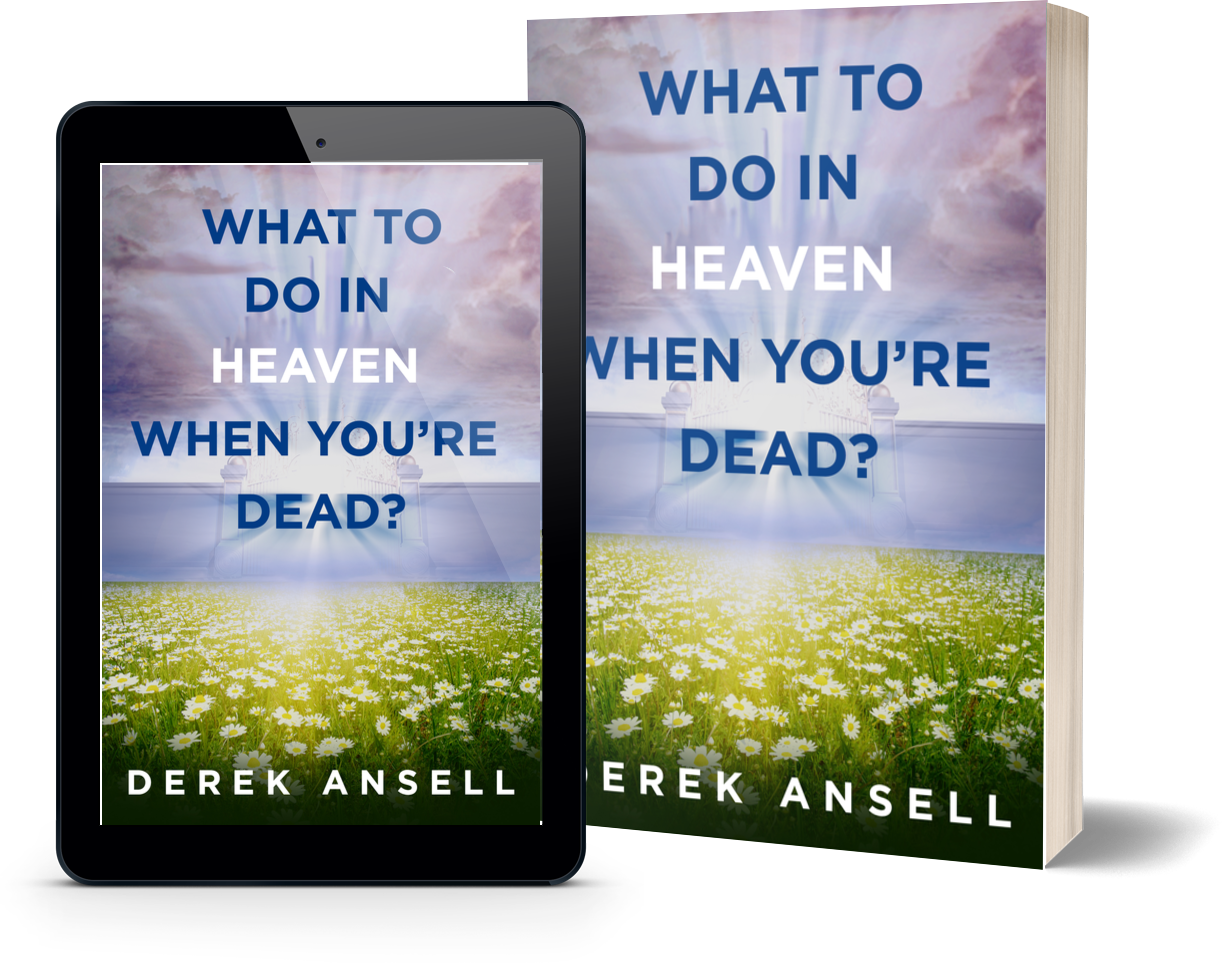What to do in Heaven when you're Dead?
Book summary
When James Webster awakens in heaven, he embarks on a journey of self-discovery in a realm of beauty, peace, and companionship. Guided by Justice, a wise mentor, and Cathy, a kindred spirit, James navigates revelations about love, loss, and growth in an uplifting exploration of what it means to thrive in the afterlife.
Excerpt from What to do in Heaven when you're Dead?
I don’t remember much about the night I died. I recall waking up from a slightly disturbed sleep and perspiring a little. Then I did feel a little uncomfortable but nothing much and not for long at all; then it was all over. All went dark and I could feel myself floating. As simple as that really. No pain, no real discomfort, just lights out. But I was certainly not prepared for what I found on arrival at the other place.
It had been an ordinary day, just like any other. We didn’t do much; we never do these days. Not at our age. Susan was up first, as she often is. She spent her usual twenty minutes in the shower room and then came out, over to the bed, and started shaking my shoulder and saying it was ten past eight. Time I was out of that bed. So, I jumped out, had a quick shower, and joined her in the kitchen for breakfast. A small bowl of corn flakes and one slice of toast. With marmalade of course. As usual. And coffee. ‘It looks like a nice day,’ Susan said, and I had to agree. The sun was shining brightly already I noted, looking out the kitchen window.
‘Did you sleep well?’ Susan asked.
‘Not bad,’ I replied. ‘My feet were cold, and I needed two trips to the bathroom.’ But that’s usual for me and has been for the past few years. Better by far than the few of my friends that are still alive who, they tell me, often have to go three, four, or even five times a night. ‘How about you?’
‘Not that bad,’ she answered. ‘I had a little cramp though. And I woke up a few times.’ Well, she does regularly although when I mentioned it, she said no, it only happened occasionally and not often at that. Then she went on a bit about Mrs. Matthews across the road who she said had cramps every single night without fail. ‘And she fell over again, in her garden; did I tell you?’
‘You did,’ I responded. ‘Twice.’
I often used to think that we should spend more time chatting to the younger neighbours and not getting endless reports of bad health, accidents, and gloomy forecasts of the future from the other oldies. Still, I wouldn’t have to worry about any of it much longer, although I didn’t know that at the time of course.
After breakfast, we went off to the supermarket to get a newspaper and some cheese and more bread as Susan had forgotten to put those items in her shopping basket the day before. We went by car because it was just a little beyond my capacity to walk there and back, although Susan could still manage it.
‘I’ll drive,’ I offered cheerfully.
‘You won’t,’ she replied. ‘You’re seventy- five and we don’t want any accidents.’
‘I don’t have accidents,’ I responded sharply.
‘Well then, let’s keep it that way, shall we?’
She still moved quite fast for someone in her seventies and was in the driver’s seat almost before I was out of the front door. She still drove far too fast though for someone of her age, and I didn’t like the way she approached corners and roundabouts at speed and slammed on the brakes at the last minute. I kept on complaining about it, but she took no notice. Then she had the brass neck to keep saying that I drove far too fast. We managed to reach the supermarket in one piece however and bought our grocery items and a Daily Telegraph. I didn’t like its political leanings, but it was, at least, good for news reporting.
As usual, when we visited the supermarket together, we went upstairs for a cup of coffee. Susan liked it up there because you could sit by the rails and look down on the supermarket aisles. She liked to look down and see who was there and look out for people she knew. I think she also liked looking to see what people put in their trolleys, but she denied this strenuously. As we sipped hot frothy coffee, she told me that poor old Mrs. Hoskins at number twelve had been diagnosed with dementia.
‘I know, ’I said. ‘You told me two days ago.’
‘Well, I can’t remember everything,’ she replied a little haughtily. ‘I have enough to do all round, and looking after you in particular.’
‘I suppose you’ll say I told you about Mr. Harris falling at home and breaking his ankle?’ she enquired.
‘Yep.’
‘Yes, well he can’t get out at all now and his wife isn’t much better.’
I thought it was time to change the subject so I told her about a programme on television she might enjoy watching. After a few words about being too busy to watch much television lately, she finally, reluctantly, accepted that it sounded promising. Then we went home for lunch.
We only had a very light lunch usually and that day was no exception. I did feel a slight feeling of nausea and discomfort in the afternoon and even a slight chest pain, but I put it down to indigestion and ignored it. I read the paper, but it was all about politicians behaving badly. As usual. You know, I remember the antics of Harold Macmillan and Anthony Eden who destroyed his career by being aggressive towards the Egyptians over Suez, but none of them seemed quite as selfish and dishonest as today’s bunch.
Dinner in the evening was a quiet time. We had fishcakes and vegetables and talked about how cold it was for the time of year. Then Susan wondered why Mr. Fisher’s car was not in the drive and hadn’t been for some days. Long service, I suggested, or maybe he had scraped it turning into his drive. Such things had been known. Then I made the mistake of asking Susan what she planned to do that evening.
‘Well, I thought I might do a pole dance in my bra and knickers in the kitchen,’ she said.
There was no need for that sort of response. Anyway, there was no pole in the kitchen. So, of course, we ended up doing what we always did and read a bit more in the paper, did a simple crossword, and watched television later. Susan enjoyed a chat show with some almost famous guests telling rude jokes and using four-letter words. I found it mildly amusing but lightweight. And a bit vulgar to be fair. Then we went up to bed and sleep, for the last time in my case.
***
It's the floating sensation that I can’t make sense of. One moment, I appear to be floating gently through time and space and at others, I don’t feel I am moving at all. I can see drifting, changing cloud formations and what looks like a clear blue sky. It’s odd. I don’t appear to be lying down or standing up but now I’m definitely aware of moving. An out of body experience? I suppose it must be because I can’t see or feel any body. Well, it makes sense really. When you die, you leave your physical body, and your soul floats off. That’s what we are taught, isn’t it? Or words to that effect.
The light is quite dazzling really. Bright, cloudless sky now although there is no visible land. I still appear to be floating but am only vaguely conscious of movement. I wonder what is happening to me and where I am going. I can’t remember a thing after I died of course. I also only have vague memories of the life on earth. People and places. I would have liked to have said goodbye to Susan but that wasn’t possible. Still, we did have a good fifty years together and that’s more than most people get.
Now, there is a change. I appear to be in a large hall or space with bright light all around. Walls and ceiling, if they exist, seem to blend in together with no edges or corners. And no visible windows. A man is standing in front of me smiling. He appears to be wearing all white clothing of indiscriminate style or texture. Without definition of shirt, trousers or anything of that sort. His smile and facial expression though, are wonderfully warm and friendly.
‘Welcome,’ he says in soft, dulcet tones that sound musical.
‘Where am I?’ I enquire politely.
‘In a safe, good place.’
Well, that’s nice to know. I feel a warm glow as if all is well and I am in a good place although I can’t quite get used to somewhere that is bright, clean, and fresh, but where the contours of buildings all seem to blend in together. Now when I look again, I can see the outline of a window—although I’m sure it wasn’t there before. Odd that. The man in front of me seems to have the capacity to read my thoughts and tells me not to worry, all will seem natural in due course, and I need not concern myself with details that appear incomprehensible. I will come to accept it all easily enough.
He invites me to sit down but I point out that there are no chairs. His smile is warm and engaging as he invites me to do what he does. He takes a sitting position, and I am amazed to see a richly upholstered armchair literally fold around him as he sits. He nods in an indication that I should do exactly the same, and I understand what he means. So, I attempt to sit down and sure enough I find a soft, warm seat fold under me and support me into a sitting position. The arms of the chair support my elbows down to my hands and it is very comfortable. I smile.
‘You have questions for me,’ he says. It is a statement, not a question.
‘Yes,’ I reply. ‘Where am I?’
‘As I just said: in a good place.’
Well, yes, maybe, but that’s hardly an answer. I want to know much more. I ask him if I am in heaven.
‘We don’t use that description here.’
‘No? Well, where am I then?’
I am told that it is generally known as the transit-location. A stopping-off point of which there are very, very many all over the universe. It is a place of understanding. Understanding is the key. When we understand, we move on. We move forward. I need not worry he tells me. I am in the ‘good’ place. Where I can learn and begin to understand. In the other place, it is much harder.
‘Down in hell?’
‘We don’t use that description here.’
No, of course they don’t. I should have known. Or guessed. Maybe they call it the Detention Centre, or the place for criminals and evil people. When I say so, he smiles that benign smile again and says not quite, but it is known generally as the Leaning Centre of Detention and the beginnings of understanding. I am fortunate, he tells me, to have been assigned to the upper house and it will be easier to begin the process of understanding. ‘So,‘ I say, ‘I died and left my earthly life. I am dead.’
‘You left after your term on earth expired.’
‘Yes, ‘I say. ‘I died.’
‘We don’t use those terms here; they are earthly descriptions. Only people on earth discuss death and dying.’
‘They don’t actually,’ I respond irritably. ‘They say he “passed on” or “he passed away” or he “passed over.” Nonsense expressions to avoid the word death.’
‘People on earth fear death when there is no need,’ he says quietly. ‘It is a natural progression.’
‘And it doesn’t hurt a bit,’ I say, speaking from almost immediate experience.
















Praesent id libero id metus varius consectetur ac eget diam. Nulla felis nunc, consequat laoreet lacus id.